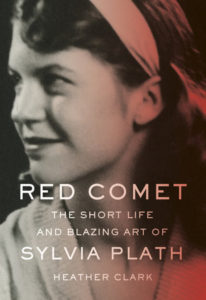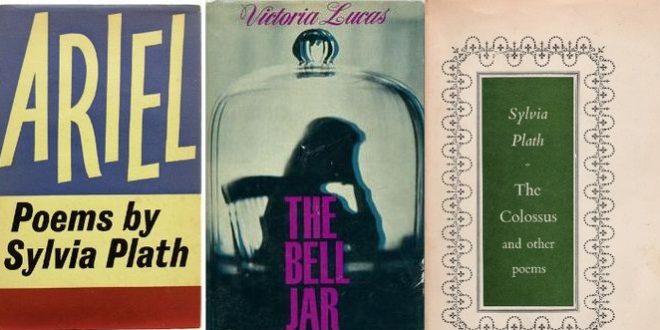Podcast: Play in new window | Download (Duration: 59:01 — 81.1MB)
 Our opening song is “Stardust,” a song written by Indiana native Hoagy Carmichael and here performed by Dave Brubeck off the live album Jazz at Oberlin recorded in May of 1953.
Our opening song is “Stardust,” a song written by Indiana native Hoagy Carmichael and here performed by Dave Brubeck off the live album Jazz at Oberlin recorded in May of 1953.
In June of that same year Sylvia Plath would find herself in New York as an intern at Mademoiselle magazine. In August she would attempt to end her life by swallowing sleeping pills, hiding herself away in the crawlspace under her house in Wellesley, Massachusetts. She had already been the recipient of electroshock therapy.
Sylvia Plath matters in many ways: first as a poet, but also as a lens through which to see and critique her times and ours. Her life in the mid-20th century is chronicled as fully in her own words as it is by the biographers to come, by those who would solve the problem of her death, and by those who would see her death as the value proposition for her work.
Sylvia Plath died by suicide on February 11, 1963, at the age of thirty, and in doing so bequeathed the literary and academic world a separate entity, an industry even: a case to work on, a subject to investigate, a wound to bandage or make bleed again.
 Plath suffered from depression and suicidal ideation from very early in her life. Her death is often all one knows about her – head in an oven, her two children in bed, probably awake. She took great pains to be sure they were not harmed and that they would be found and cared for on that day. One cannot read her work without casting an eye at every phrase as if it reveals the death to come.
Plath suffered from depression and suicidal ideation from very early in her life. Her death is often all one knows about her – head in an oven, her two children in bed, probably awake. She took great pains to be sure they were not harmed and that they would be found and cared for on that day. One cannot read her work without casting an eye at every phrase as if it reveals the death to come.
We may read in Plath’s life a chapter in the history of psychiatry. And it is a tale of woe and misogyny – made most explicit in Plath’s one published novel, The Bell Jar. But there is no dearth of literature and reportage detailing the harrowing treatments on offer by this so-called scientific profession. During this period electroshock therapy was done as often by itinerant practitioners, “shock artists,” as by established and regulated doctors. Our guest today stresses that Plath’s fear of institutionalization and more shock therapy in 1963 was surely one motivation for her final act.
Sylvia Plath worked with intense dedication to be heard in a world that often has no ears to hear women. But, Plath was a woman who wrote many times of her disdain for women, for being a woman, and in her journals she often wrote of the women who might be her competition. Of men, they were her peers and she would count their opinions and assistance as most relevant to her. And, we must see this, at least on one level, as pragmatic. Men did, and do, hold the cards and pull the strings.
 GUEST
GUEST
Heather Clark, a professor of contemporary poetry at the University of Huddersfield and author of the new biography, Red Comet: The Short Life and Blazing Art of Sylvia Plath, published by Knopf. She’s also the author of The Grief of Influence: Sylvia Plath and Ted Hughes (Oxford, 2011).
POEMS read by Plath (musical bed)
“Lady Lazarus” (“Variants on a Theme of Thelonious Monk (Criss Cross) : Variant III,” John Lewis Presents Jazz Abstractions)
“Mushrooms” (“The Oracle,” Dave Holland Quartet, Extensions)
“The Applicant” (“Brötzmann,” Peter Brötzmann, 3 Points and a Mountain)
RELATED
On Sylvia Plath’s Creative Breakthrough at the Yaddo Artists’ Colony by Heather Clark
‘Only Did What Poetry Told Us to Do:’ A Portrait of Sylvia Plath on Honeymoon With Ted Hughes by Heather Clark
“Ted, Sylvia and me” by Al Alvarez (2004)
Let her be Ariadne by Ann Kennedy Smith (Book Review of Red Comet)
Of Her Kind: Radcliffe’s Messy Experiment in Women’s Liberation (Interchange with Maggie Doherty)
MUSIC
“Stardust” performed by The Dave Brubeck Quartet (1953)
“Don’t Let the Stars Get in Your Eyes” performed by Perry Como (1953)
“The Island of Dreams” performed by The Springfields (1963)
“Pretend” performed by Nat King Cole (1953)
CREDITS
Producer & Host: Doug Storm
Executive Producer: Kade Young
Collage by Sylvia Plath, 1960 Mortimer Rare Book Collection, Smith College ©Estate of Sylvia Plath
 WFHB Bloomington Community Radio
WFHB Bloomington Community Radio


